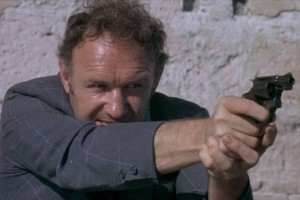I’m not one to get giddy over the technically sound nature of movie making, but when witnessing a piece of absolute cinematic beauty that is the 1971 William Friedkin classic “The French Connection,” I give credit where its due.
I knew going in that the picture was something of movie royalty, preserved by the Library of Congress and lauded consistently by the American Film Institute as one of the best American made films of all time. “The French Connection” was nominated for an astounding eight Academy Awards – five of which it won – and was the first ever movie with an ‘R’ rating to capture the honor of Best Picture.
I knew it featured two all time top actors in Gene Hackman and Roy Scheider. Hackman would win the award for Best Actor, Scheider would receive a nomination for his supporting role – both deservedly so.
What literally blew me away was the atmosphere and cinematography. “The French Connection” was filmed on-location, with scenes jumping from various parts of New York City all the way to France, and the result is so much better than the cookie cutter Hollywood stage and green screen antics of today.

“The French Connection” serves as a prelude for the now common theme of a tough handed and rogue cop who disregards protocol and the rights of the bad guys in order to get a job done.
Gene Hackman plays said maverick with the role of Detective Jimmy Doyle. Nicknamed Popeye, Doyle is a narcotics officer who takes the term war on drugs to the next level. Never showing fear, one scene shows Popeye single handedly shaking down an entire room of thugs and while it appears a bit silly at first, it shows the tenacity and prowess of the character. Everyone knows the iconic Clint Eastwood role in “Dirty Harry“; Popeye Doyle was mopping up the streets of hoodlums and low-lives two months before.
Roy Scheider of “Jaws” fame plays Popeye’s partner Buddy Russo. Buddy (nicknamed Cloudy) represents a perfect sidekick to the hero, and the wavering attempt at a voice of reason and sanity in Popeye’s ear. The pair of detectives are racially blunt without a shred of political correctness in their ways. They’re brutal when need be, and neither seem to have any idea what the Miranda Rights are.
Each scene is filmed like a short movie of its own, brought to life by the simply perfect backdrop of early 70s New York City. One scene shows a drunken Popeye staggering out of a seedy bar. Another depicts a group of youths playing street hockey with a crushed aluminum can serving as the puck. Little nuances like this, coupled with a perfect cops and robbers score, and sound effects as subtle as the cadence of shoes stepping on stone, are what make the film flourish with perfection.
Action scenes are scattered from start to finish. One of which depicts a car chase with Popeye commandeering a civilian’s vehicle to chase down a murder suspect on an L-train The scene is widely regarded as one of the best car chases in movie history and rightfully so. The action is intense and serves as an obvious blueprint for similar scenes in movies like “The Bourne Identity” and “Fast and the Furious.”
One interesting side note, Friedman was not in favor of casting Gene Hackman for the role of Popeye. His initial choices of Paul Newman, Jackie Gleason, and Steve McQueen were too far out of budget. Sometimes less is more, and the discounted price Hackman certainly proves that.
“The French Connection” goes down as many things. Man Movie. Classic Film. And must own dvd.
Its a technically sound film, and a thoroughly enjoyable watch.
by – Matt Christopher